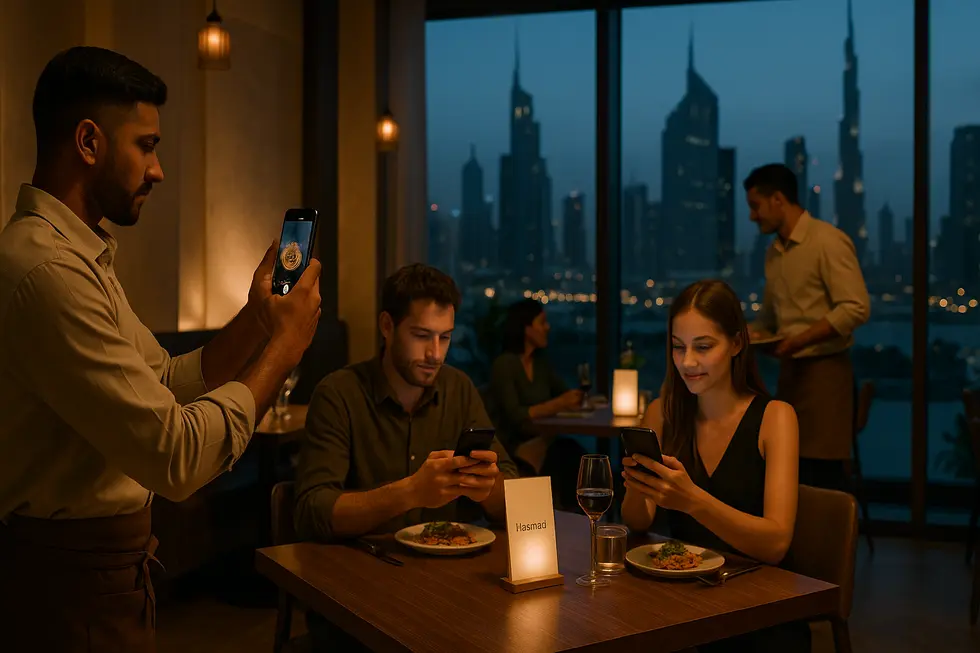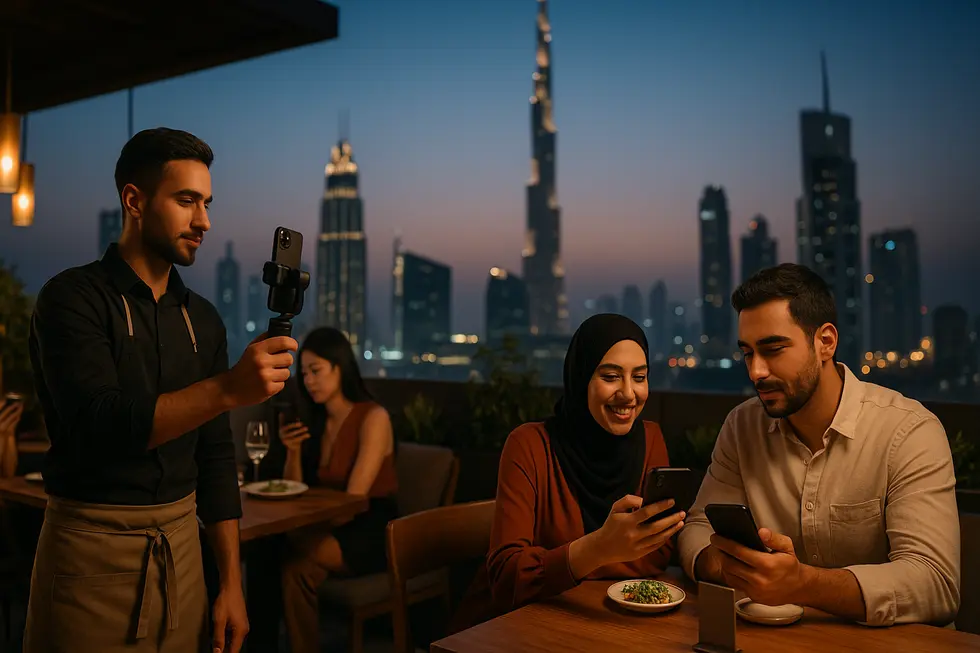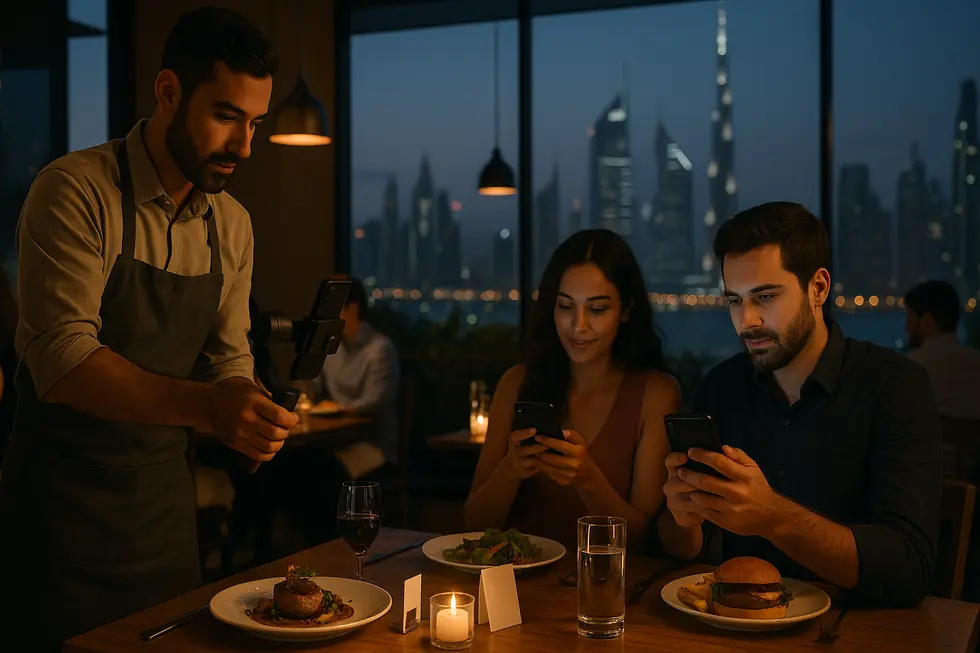Instagram Isn’t Enough: Smarter Social Media for Restaurants in 2025
Dubai 4-star F&B teams must adopt smarter social media for restaurants by mixing short-form video, AI personalization, and local search optimization.
Social Media for Restaurants
Tech-Driven Creativity: Building Video-First, UGC-Powered Social for Restaurants

1. Technical Architecture and Creative Production for Short-Form Video and Authentic UGC
To convert short-form attention into orders, restaurants must align a simple technical stack with purposeful creative workflows. A central content hub stores videos, captions, tags, and UGC permissions, while social commerce plugs enable in-app ordering and tracking. AI tools suggest cut points, captions, and audience targets, and a lightweight CMS pushes assets to TikTok, Reels, and Shorts with SEO-friendly metadata. Creative production blends staged food photography with candid guest clips and micro-stories that show craft and personality. Encourage tagging and reposting to build social proof, and automate ingestion of UGC with rights capture. Maintain visual and voice consistency across channels and website; for guidance see our restaurant branding guide. Daily community responses, local collaborations, and reuse templates keep cadence efficient. This architecture turns spontaneous content into measurable revenue by shortening discovery-to-purchase paths and improving search visibility. External research on these trends is available here: https://tableneeds.com/blog/marketing/2025-restaurant-marketing-trends/
2. From Views to Visits: Business Strategy for Short-form Video, UGC, and Local Ads
Short-form videos and authentic user content must be treated as revenue drivers, not decoration. Short-form formats deliver higher engagement and increase local discovery. User-generated content multiplies trust and lowers acquisition cost. Smart restaurants blend paid local ads with organic UGC to reduce cost per reservation and raise lifetime value. Track outcomes with clear KPIs: CAC, cost per booking, conversion rate, and LTV. Use promo codes, UTM links, and reservation pixels to map impressions to spend. Apply AI personalization and influencer boosts to improve creative-performance matching. Maintain omnichannel consistency so email, website, and loyalty programs convert first visits into repeats. Invest in local SEO and accurate profiles to capture high-intent searchers. Regular A/B testing and a unified dashboard keep strategy efficient and scalable. For brand positioning guidance, see this resource on standing out: https://www.markus-mensch.ae/blog/restaurant-brand-stand-out-dubai-43167
https://www.superiorseating.com/blog/2025-social-media-trends-for-restaurants
3. Platform Politics and Public Trust: Societal, Regulatory, and Geopolitical Forces Shaping Short-Form Video and UGC
Short-form video and authentic user-generated content thrive on trust and reach, yet both now sit inside a complex social and political frame. Consumers expect transparency, community engagement, and ethical moderation; content that feels corporate can repel local diners. At the same time, regulators demand clearer disclosures for paid posts and stricter data handling, forcing restaurants to document influencer agreements and protect guest data. Geopolitical shifts can restrict platform access, so a single-channel strategy risks sudden audience loss. That reality makes diversified publishing, owned-content backups, and localized formats essential. Balance creativity with compliance: prompt UGC with clear consent, optimize captions for search, and use paid amplification where rules allow. For guidance on aligning brand voice with market realities, see this piece on restaurant branding in Dubai. Data and trend sources: https://cropink.com/restaurant-social-media-statistics
From Feed to Footfall: AI Personalization and Search Integration for Local Restaurant Discovery

1. Building the Tech Trifecta: AI Personalization, Influencer Reach, and Search-Indexed Social Content
The technological foundation for smarter restaurant marketing blends AI personalization, influencer reach, and search-indexed social content into one engine. AI models parse booking history, order patterns, and interaction data to deliver timely, tailored messages and offers that boost conversion and loyalty. Local influencer collaborations and customer-created content supply authentic social proof while expanding reach and cutting production costs. As social posts become searchable assets, optimizing captions, location tags, and video transcripts for local queries turns feeds into discovery channels for diners ready to buy. Short-form video and frictionless ordering connect curiosity to purchase in fewer steps. Maintain consistent tone, visuals, and offers across social, web, and email to amplify each touchpoint. Together, personalization, credible voices, and search visibility drive measurable local lift for restaurants moving beyond a single-app strategy. For guidance on brand positioning, see restaurant branding strategies. https://www.superiorseating.com/blog/2025-social-media-trends-for-restaurants
2. Profit from Presence: Influencer ROI, AI-Powered Monetization, and Cost Strategies for Local Discovery
Turning social attention into revenue demands a clear economic model that combines AI personalization, influencer partnerships, and search-optimized content. Start by mapping costs—paid media, creator fees, video production, and platform tools—against measurable outcomes like reservation clicks, coupon redemptions, and repeat visits. Use AI to segment audiences and serve offers that lift conversion and reduce wasted ad spend. Structure influencer deals around performance: flat fees plus bonuses for tracked bookings, affiliate links, or UTM-coded menu orders. Leverage user-generated content to cut creative costs while boosting authenticity. Balance short-term paid campaigns with long-term loyalty investments that increase customer lifetime value. Track ROI through unified dashboards linking social metrics to POS and reservation systems. Small restaurants should pilot low-cost micro-influencer tests before scaling. This mix protects margins while driving measurable foot traffic. For practical branding tips, see how to make your restaurant brand stand out. External reference: https://tableneeds.com/blog/marketing/2025-restaurant-marketing-trends/
3. Beyond Instagram: Privacy, Platform Power, and Community Resilience
As restaurants expand beyond Instagram, they must balance AI-driven personalization with privacy and platform influence. Compliance with data laws like GDPR and CCPA is nonnegotiable; limit collection, secure consent, and explain ad targeting. Algorithms and platform policy shifts can erase reach overnight, so diversify across short-form video outlets, search, email, and owned loyalty channels to retain control. Local resilience grows from authentic partnerships: collaborate with nearby vendors, host community events, and amplify guest stories to build trust beyond paid reach. Influencer work still drives discovery, but require transparent disclosures and fair contracts to protect reputation. Geopolitical restrictions and cross-border data rules complicate ad targeting and moderation; keep contingency plans and local legal advice. Practically, invest in first-party data, SEO-friendly social content, and clear privacy notices. For branding tactics, see restaurant-branding-dubai. Small steps protect guests and preserve long-term growth. External research: https://www.superiorseating.com/blog/2025-social-media-trends-for-restaurants
Tech-Driven Integration: Omnichannel Consistency, Mobile-First Loyalty and Reputation Management

1. Unified Tech Playbook for Restaurants: Integrating Omnichannel Presence, Mobile-First Loyalty, and Reputation
Restaurants must treat marketing as a connected system rather than isolated channels. A unified brand voice and visual identity must appear across short-form platforms, websites, and email. Consistency reduces friction and boosts recognition. Mobile-first loyalty programs drive repeat visits with personalized rewards, frictionless ordering, and timely offers. Tie loyalty to social behavior by rewarding UGC and check-ins. Use the F&B playbook to build guest loyalty through incentives and seamless mobile experiences. Reputation wins come from rapid review responses and soliciting guest photos. Route negative feedback into private recovery workflows. AI and analytics glue these pieces, delivering targeted ads, personalized content, and cross-channel measurement. Short-form video and authentic testimonials amplify credibility while feeding search-indexable content. Combine consistent creative, mobile loyalty mechanics, and active reputation management to convert discovery into reservations and repeat visits. For more, see https://www.superiorseating.com/blog/2025-social-media-trends-for-restaurants
2. From Feed to Floor: Revenue-First Omnichannel Loyalty and Reputation Optimization
To turn social attention into steady revenue, restaurants must design an economic model that ties omnichannel consistency to measurable customer value. Consistent pricing, promotions, and menu information across social, web, and in-person channels reduce friction and boost conversion. Mobile-first loyalty programs capture repeat business with personalized offers, pushable rewards, and frictionless redemption. When loyalty is segmented by behavior and lifetime value, targeted promotions raise average check and frequency. Active reputation management converts reviews and user content into social proof, lowering acquisition cost. Local SEO and precise social ads funnel high-intent diners to reservation and ordering flows. Data flows between POS, CRM, and marketing allow CAC and LTV to be monitored and optimized continuously. For practical brand positioning advice, see this piece on restaurant branding in Dubai: https://www.markus-mensch.ae/blog/restaurant-branding-dubai. Further strategy details: https://www.klaviyo.com/industry/restaurants/marketing-ideas
3. Reputation, Regulation, and Social Trust: Building Consistent Omnichannel Experiences
Consistent brand experience across platforms affects trust, discovery, and legal risk. Omnichannel consistency keeps pricing, menus, and promotions aligned on Instagram, TikTok, YouTube Shorts, websites, and ordering channels, preventing customer frustration. Mobile-first loyalty programs deliver personalized rewards and consented data, increasing repeat visits and lifetime value. Reputation management requires active review monitoring, prompt responses, and encouragement of authentic user-generated content to amplify social proof. Because social posts are increasingly indexed by search engines, captions must use local, high-intent keywords to capture diners searching to buy nearby. Evolving regulations around advertising and data privacy demand transparent opt-ins, clear disclosures, and accurate claims to avoid fines and erosion of trust. When consistent messaging, compliant loyalty mechanics, and authentic content combine, restaurants convert awareness into repeat business and community goodwill. See the practical guide: fnb-build-guest-loyalty. Transparent policies also protect vulnerable consumers and strengthen local communities. https://www.superiorseating.com/blog/2025-social-media-trends-for-restaurants
Final thoughts
In 2025, Instagram remains important but no longer suffices as a standalone strategy for Dubai 4-star restaurants. Operators that prioritise short-form video and user-generated content will capture attention, while AI personalization and influencer partnerships convert local intent into bookings. Equally critical is making social content discoverable via search signals and ensuring a consistent, mobile-first guest journey from first view to loyalty redemption. Implementing these interconnected tactics with measurable KPIs turns social media from a marketing cost into a revenue driver. Start small, measure fast, and scale what works. Let’s take your F&B social strategy to the next level - contact us now.
About us
Markus Mensch is a strategic marketing consultancy specialising in hospitality and F&B brands, with offices in Dubai and Germany. Since 2007, the company has supported over 1,000 businesses in increasing visibility, guest loyalty, and revenue without relying on paid ads. With the proprietary OBC-Strategie®, Markus Mensch and his team provide structured, result-oriented solutions tailored to 4-star hotels and restaurants. The company combines marketing expertise, industry experience, and hands-on implementation to help clients achieve sustainable growth. Made in Germany - Built for Dubai
Transform Your Hospitality Business Today
Are you ready to boost your revenue and enhance guest loyalty? Let's get started!

